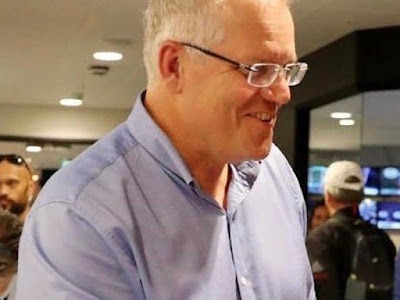Scott Morrison : Australia’s Climate Stance Still Fuels Friction With Neighbors
pada tanggal
Sunday, January 20, 2019
 CANBERRA, LELEMUKU.COM - Australian Prime Minister Scott Morrison has wrapped up a three-day trip to the South Pacific to reassure vulnerable island nations that Canberra is serious about tackling climate change.
CANBERRA, LELEMUKU.COM - Australian Prime Minister Scott Morrison has wrapped up a three-day trip to the South Pacific to reassure vulnerable island nations that Canberra is serious about tackling climate change.Morrison told Pacific Island leaders that Australia would meet its international obligations to reduce carbon emissions in line with the Paris climate change agreement.
Many low-lying communities fear that rising sea levels will force them from their homes. In Samoa, coastal villages are already making plans to relocate to higher ground in the nation’s volcanic interior.
Morrison’s three-day trip to Vanuatu and Fiji has been described by foreign policy experts as mostly a success.
Coal a sticking point
But climate change remains a source of friction between Australia and its smaller neighbors. Fiji’s Prime Minister Frank Bainimarama criticized Canberra for not doing more to cut greenhouse gas emissions and reduce the economy’s reliance on coal. Australia has some of the world’s highest per capita rates of carbon pollution.
Australia is also eager to counter China’s growing strategic influence in the South Pacific, although Morrison insists all countries should work together.
“We are here because we are for the independent sovereignty and prosperity of Vanuatu because they are our Pacific neighbors and family. That is why we are here,” he said. “Our objectives and our motives here, I think, are very transparent to our family and friends here in the Pacific, particularly here in Vanuatu. This question is put to me all the time. I mean, we do not have to choose. We just have to work cooperatively together.”
Australia has also mended a previously fraught relationship with Fiji. Prime Minister Bainimarama is a former commander of the Fijian military who deposed an elected government in 2006. Democracy was restored to Fiji, an archipelago of about 900,000 people, in 2014.
Countering China
Pacific nations have debts of about $4 billion. Creditors include the World Bank and the Asian Development Bank, while $1 billion is owed to China.
Experts say that some South Pacific countries have preferred to take out loans from China rather than accept grants from Australia because the process was simpler and less bureaucratic. (VOA)

